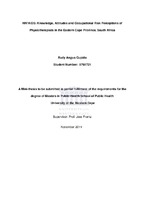| dc.contributor.advisor | Frantz, Jose | |
| dc.contributor.author | Cupido, Rudy Angus | |
| dc.date.accessioned | 2016-09-22T10:17:38Z | |
| dc.date.available | 2016-09-22T10:17:38Z | |
| dc.date.issued | 2011 | |
| dc.identifier.uri | http://hdl.handle.net/11394/5236 | |
| dc.description | Magister Public Health - MPH | en_US |
| dc.description.abstract | Human Immune-deficiency Virus (HIV) and Acquired Immune Deficiency Syndrome (AIDS) is a major public health problem. Globally, the number of new HIV infections is decreasing but the total number of people living with the disease is increasing. An estimated 5.7 million South Africans are currently living with the disease. The life expectancy of people living with HIV (PLHIV) in South Africa has slowly increased due to the availability of Anti-Retroviral Therapy (ART). The progressive "chronicity" of HIV may be associated with a variety of impairments and disabilities for people living with HIV. This emphasising the increasingly important role that physiotherapists play to minimize the disabling impact of the disease and improve quality of life for PLHIV. The aim of study was to determine the HIV/AIDS knowledge, attitudes and the occupational risk perception of physiotherapists practicing in the Eastern Cape Province, South Africa. This study utilized a cross sectional descriptive quantitative survey to collect data. The data was collected via a structured self-administered postal questionnaire. The questionnaires were captured in Microsoft Excel and analysed statistically using CDC Epi-Info version 3.5.1. Data was analysed descriptively and the chi-square test, T-tests and ANOVA was used to identify any statistically significant relationship between variables. The results of the study identified that the physiotherapists in the study have "high" general HIV related knowledge, although major gaps regarding HIV prevention and transmission still exists. The physiotherapists expressed a positive attitude towards PLHIV, while they perceive themselves to be at low risk of HIV transmission risk when managing PLHIV. The physiotherapists with more than 10 years' experience had significantly better HIV related knowledge compared to those with less than 10 years' experience while the attitudes of married physiotherapists towards PLHIV were significantly less favourable than those who were not married. There is a need for intervention strategies to address the HIV knowledge gaps of physiotherapists. Intervention strategies need to address physiotherapists HIV prevention and transmission knowledge. | en_US |
| dc.language.iso | en | en_US |
| dc.publisher | University of the Western Cape | en_US |
| dc.subject | Human Immune-deficiency Virus (HIV) | en_US |
| dc.subject | Acquired Immune Deficiency Syndrome (AIDS) | en_US |
| dc.subject | Physiotherapists | en_US |
| dc.subject | Occupational risk | en_US |
| dc.subject | HIV (Viruses)--Transmission | en_US |
| dc.subject | People living with HIV and AIDS (PLHIV) | en_US |
| dc.title | HIV/AIDS : knowledge, attitudes and occupational risk perceptions of physiotherapists in the Eastern Cape province, South Africa | en_US |
| dc.rights.holder | University of the Western Cape | en_US |

